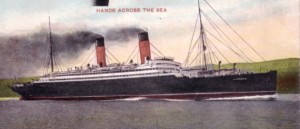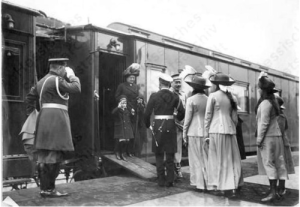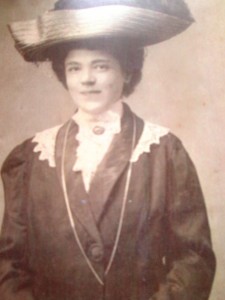

 In 1906, my grandparents fled Russia. They left by ship, The Carmania, and sailed through from Liverpool to Ellis Island, New York City. They escaped with the clothes on their backs (“our best clothes” my grandmother always emphasized.) The women wore beautiful white lace “waists”, ankle-length skirts, high button shoes; the men were well-turned out in waistcoats with watch chains and fobs. In my grandmother’s case, she fled Russia with the hat on her head— a plumed bonnet. “I could not leave that hat behind,” she said.
In 1906, my grandparents fled Russia. They left by ship, The Carmania, and sailed through from Liverpool to Ellis Island, New York City. They escaped with the clothes on their backs (“our best clothes” my grandmother always emphasized.) The women wore beautiful white lace “waists”, ankle-length skirts, high button shoes; the men were well-turned out in waistcoats with watch chains and fobs. In my grandmother’s case, she fled Russia with the hat on her head— a plumed bonnet. “I could not leave that hat behind,” she said.
They left behind everything else — their home, actually homes, plural. As the premier tea importers of black tea from China to Russia, my family owned houses throughout Russia — in the city of St.Petersburg, a dacha, in the countryside near Tsarskoe Selo, where the Tsars famously inhabited the Alexander and Catherine Palaces, in Yekaterinburg, where the last Tsar’s family perished and in Belarus in the city of Minsk.
For the rest of their lives, my grandmother and her sister spent every Sunday supper, recounting the circumstances of their departure and the details of decoration in their favorite rooms—“I had a white room, with white silk papered walls, and a white canopied bed and white carpets,” my grandmother would say in a special ritual tone reserved for her last bedroom in Russia. “I even had a white dog, Belka.”
“White, white”, they would recite. My grandmother’s youngest sister, my great aunt Dora, remembered their summers; they dressed in Victorian whites, beautiful gauze dresses, embroidered, white upon white. Then, always at some point in the Sunday evening, usually over sweetened strong tea and candied orange peels, Dora’s voice would crack and she would tell the story of their brother Mikhail and Bloody Sunday and why they had to flee in such haste —selling everything but those clothes and a few photographs—for the “ship cartes” to carry the family to America.
My family’s story was typical of their time—Jews running away from Russia before they would die in the pogroms.
